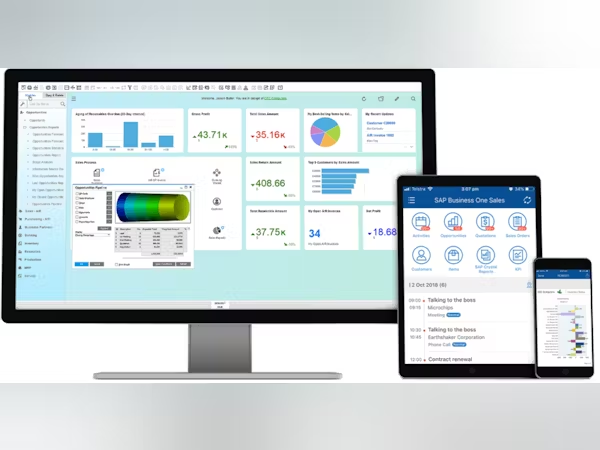
Table of Contents
SAP, short for Systems, Applications, and Products in Data Processing, is a powerful enterprise resource planning (ERP) system widely used by businesses of all sizes to streamline operations, enhance efficiency, and foster growth. It integrates various business processes, providing a centralized platform for managing key functions, including finance, supply chain, human resources, and customer relationships. This comprehensive guide explores SAP’s significance in modern business, its components, benefits, and how organizations leverage its capabilities to achieve competitive advantages.
Understanding SAP: A Comprehensive Overview
SAP was founded in 1972 in Germany with the vision of developing standardized software to optimize business processes. Over the decades, SAP has evolved into a market leader in ERP solutions, serving industries such as manufacturing, retail, healthcare, and technology. Today, SAP’s software suite includes numerous modules and tools designed to address diverse business needs.
Key Components of SAP
- ERP Core Modules
SAP ERP is the backbone of its ecosystem, encompassing modules like:- Financial Accounting (FI): Handles financial transactions, reporting, and compliance.
- Controlling (CO): Focuses on cost management and profitability analysis.
- Material Management (MM): Streamlines procurement and inventory processes.
- Sales and Distribution (SD): Manages sales orders, billing, and logistics.
- Human Capital Management (HCM): Oversees workforce management and payroll.
- SAP S/4HANA
SAP S/4HANA is the next-generation ERP solution, offering real-time data analytics and simplified processes powered by SAP’s in-memory database technology. It provides enhanced speed, scalability, and integration capabilities, making it ideal for businesses embracing digital transformation. - SAP Business Technology Platform (BTP)
This platform includes tools for data management, analytics, artificial intelligence, and application development. SAP BTP allows businesses to customize their SAP environment and extend functionalities seamlessly. - Industry-Specific Solutions
SAP offers tailored solutions for various industries, such as SAP for Retail, SAP for Automotive, and SAP for Healthcare. These specialized tools address unique challenges and regulations in specific sectors.
Benefits of Implementing SAP in Business
1. Centralized Data Management
SAP consolidates data from various departments, providing a single source of truth. This eliminates redundancies, minimizes errors, and enhances decision-making capabilities.
2. Improved Efficiency and Productivity
By automating repetitive tasks and streamlining workflows, SAP reduces manual effort and operational bottlenecks. This boosts productivity and allows employees to focus on strategic initiatives.
3. Scalability and Flexibility
SAP’s modular architecture enables businesses to scale their operations and adapt to changing market demands without significant disruptions.
4. Enhanced Compliance and Reporting
SAP ensures compliance with local regulations and standards through built-in features for tax calculations, audit trails, and financial reporting. This reduces legal risks and enhances transparency.
5. Real-Time Insights
With tools like SAP Analytics Cloud and SAP S/4HANA, businesses gain real-time visibility into key metrics, enabling proactive decision-making and improved forecasting.
How Businesses Utilize SAP
Streamlining Financial Management
SAP Financial Accounting (FI) and Controlling (CO) modules help businesses manage their financial health by providing tools for budgeting, forecasting, and profit analysis. These modules enable accurate reporting and compliance with international accounting standards.
Optimizing Supply Chain Operations
SAP’s supply chain management capabilities include inventory tracking, demand planning, and supplier collaboration. These features enhance supply chain visibility and efficiency, reducing costs and improving customer satisfaction.
Enhancing Customer Relationship Management (CRM)
SAP’s CRM solutions enable businesses to deliver personalized customer experiences by analyzing customer data and predicting behavior. This fosters stronger customer relationships and drives loyalty.
Facilitating Workforce Management
SAP HCM supports organizations in managing employee lifecycles, from recruitment and onboarding to performance appraisal and payroll processing. These tools improve employee engagement and HR efficiency.
Supporting Digital Transformation
SAP’s innovative solutions, such as SAP IoT, machine learning, and blockchain, empower businesses to embrace digital transformation. These technologies enable organizations to innovate, improve agility, and gain a competitive edge.
Challenges of Implementing SAP
While SAP offers numerous benefits, its implementation can be complex and resource-intensive. Common challenges include:
- High Initial Costs: The upfront investment in SAP software, hardware, and implementation can be significant.
- Customization and Integration: Tailoring SAP to specific business needs requires expertise and time.
- Training and Change Management: Employees need proper training to adapt to the new system, and resistance to change can hinder adoption.
To overcome these challenges, organizations should work with experienced SAP consultants, conduct thorough planning, and ensure clear communication throughout the implementation process.
Future of SAP in Business
As businesses continue to navigate a rapidly evolving landscape, SAP remains at the forefront of innovation. The company is focusing on areas such as sustainability, cloud computing, and artificial intelligence to empower organizations with tools for future readiness. With the rise of SAP S/4HANA Cloud, businesses can now leverage the scalability and flexibility of cloud-based ERP solutions, ensuring they remain agile in the face of changing market dynamics.
Conclusion
SAP plays a crucial role in modern business operations by offering an integrated platform for managing critical functions. Its robust suite of tools enables organizations to streamline processes, enhance efficiency, and achieve strategic goals. From financial management to supply chain optimization, SAP provides the foundation for businesses to thrive in a competitive environment.
